I was playing Battlefield 1 with my brothers and we had a discussion on how much does it really affect having a low ping (latency) with the server or how much does it affect the rank within the game when it comes to the Score in the Scoreboard.
So I decided that I will perform a tiny statistical study with a couple of matches in the 64 player servers.
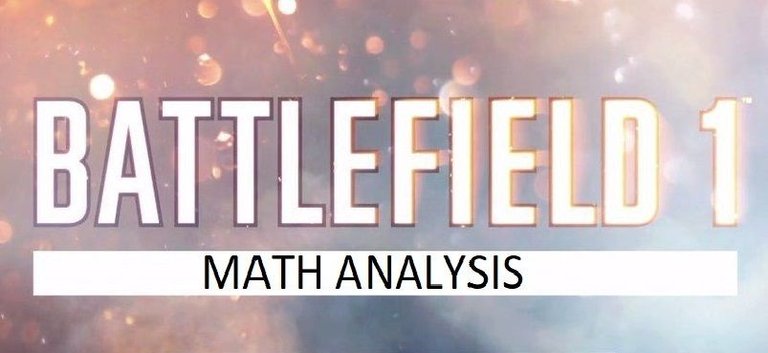
Structure of the Post
- 1) Methodology
- 2) Data Procedure & Explanation
- 3) Data Analysis
===>A) Score & Ping Correlation
===>B) Score & Rank Correlation - 4) Conclusion
- 5) References
- 6) Closing
1) Methodology
- Platform of the data collection is PS4.
- The game has now a two week period in which Premium Pass users can play the new maps on fully populated servers. The data of the users was gotten there for the simple reason that all players who have Premium are more likely to put more hours into the game.
- The collection was performed on a 64 player fully populated server on Conquest. It was performed just when the match is about to finish, just to get the accurate values for Scores. Data acquired of 83 players in total, eliminating the ones that entered too late in the match (really low score in the end of the match).
- Data collection was performed on two rounds on the same server to make and average and mitigate the Score differnce cause by new players joining mid-game (and having low score) & players who had a good streak in first round but didn't perform that well in the next one. With that, we get the more accurate result on the performance of each player.
- Finally, the data was taken only if it was a balanced match, because if it is not balanced, players who are supposed to perform well don't get their expected average Score.
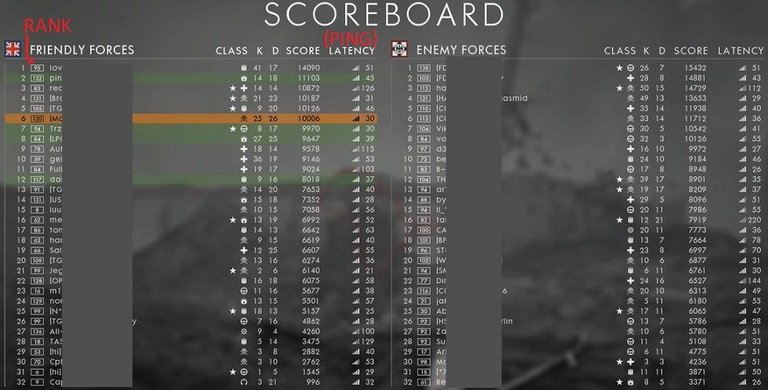
The scoreboard in the game - Names of players grayed out to protect their privacy
2) Data Procedure & Explanation
Obviously, before continuing any further, we need to understand what a Correlation is in Mathematics!

Graphical representation of Correlation - Source
A correlation is a Mathematical calculation that indicates how much are two sets of data related to each other. It is done by calculating a Pearson's Correlation Coefficient, r, whose value ranges from -1 to +1.
-) Values equal to 0 mean that there is absolutely no correlation between both sets of data.
-) Values equal to +1 mean positive correlation (if x increases, y increases) while values equal to -1 mean negative correlation (if x increases, y decreases).
-) Values in the middle such as -0.5 or +0.5 indicate low correlation.
Pearson's Correlation Coefficient
Formula: 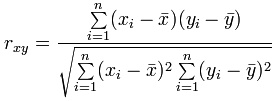 =====> x = Score ; y = Ping (or Rank)
=====> x = Score ; y = Ping (or Rank)
-) Where Σ means Summatory of the values
-) means each individual value of x (that is why it is Xi) minus the mean of values of x (x with the line on top).
means each individual value of x (that is why it is Xi) minus the mean of values of x (x with the line on top).
-) same as above, but for values of y.
same as above, but for values of y.
I used some Coefficient Calculators online to make it easier and to confirm it was correct. So far my favourite was this tool online for its calculation.
Afterwards, the collection of data was analysed and plotted in a graph with two relations, Score & ping and Score & Rank.
But also, dear Steemian, it is important for you to know how Score, Ping and Rank work in the game if you are not familiar.
- Ping = amount of delay in miliseconds between the player and the server that hosts the match. The lower the better.
- Rank = level that you have in-game. You gain experience by playing a lot of matches. The more you have played, the higher it is.
- Score = amount of points received inside the match. You can get them by killing enemies, giving supression, assist in the elimination, capturing flags, destroying vehicles, assisting in spotting enemies, healing & supplying allies...
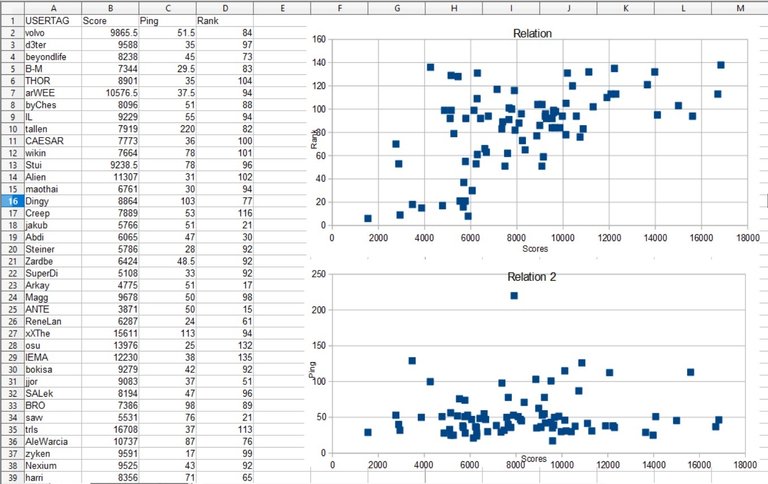
My excel table. Usernames are halved to protect their privacy - Relation 1 = Score & Rank; Relation 2 = Score & Ping
3) Data Analysis
After calculation of Pearson's Correlation Coefficient, we get the following results for both pairs of study:
A) Score & Ping correlation
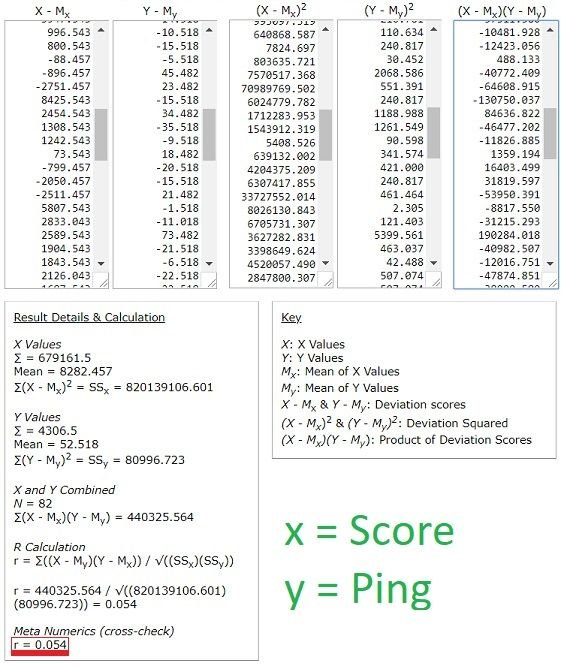
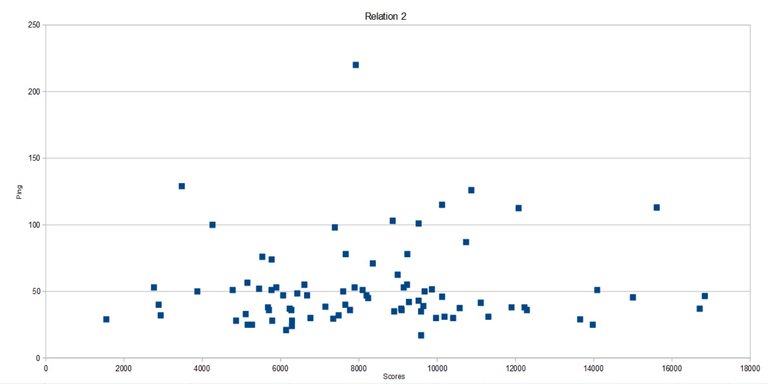
Calculation with the tool mentioned above & graph made in Excel by myself
We get the result of coefficient r = 0.054.
What does it mean?
Simple. It means that technically, there is a very tiny positive correlation between Score and Ping, but almost non-existent! In other words, that the more ping you have, the more Score you will get.
However, this correlation value is, realistically, invalid. Since, first, that value indicates a very weak relationship and second, a positive relationship is actually counter-intuitive, because a better (and accurate) experience is obtained by having a low latency instead of a high one. So the value should have been negative.
In the graph I plotted, you can actually see this, the values are scattered "all over the place" no matter which combination of Ping and Score you get.
Hence, I would interpret this data as (almost) ping being non-related to your overall score.
It has sense, as for scoring points it doesn't matter if you have a slow internet connection but rather what you do in the match.
B) Score & Rank Correlation
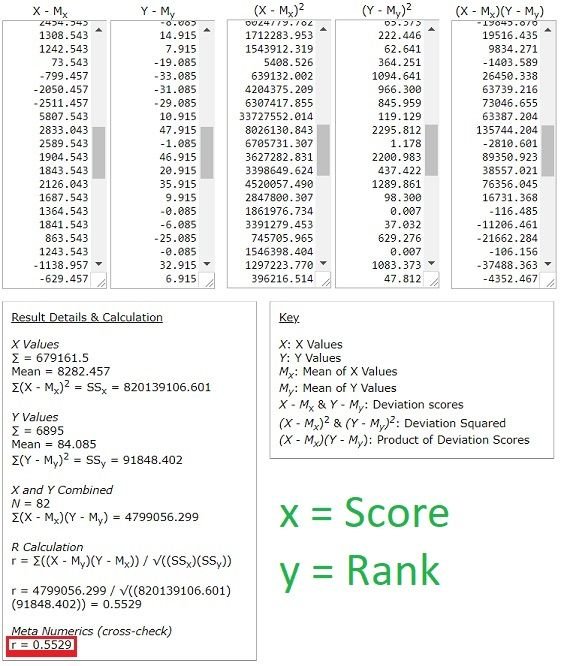
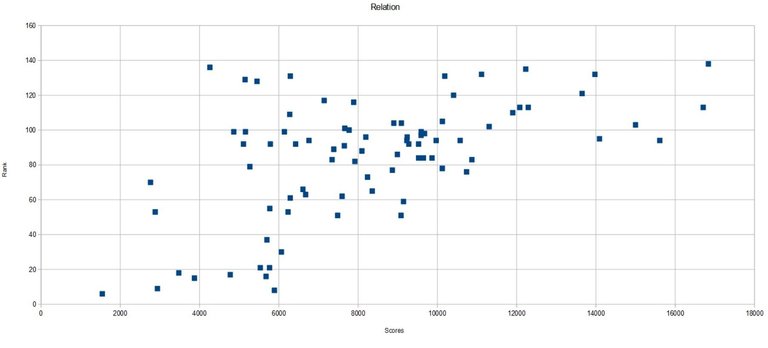
Calculation with the tool and the graph I made in Excel
After finishing with the ping I decided to calculate the correlation of Score with rank and to be honest the result surprised me a bit. So let's get into it!
After the calculation, we get the result of r = 0.5529.
It means in this case that there is a (low) positive relationship between having a high Rank and Scoring more points. It has sense, as more experienced players know all the mechanics of the game and can play better, scoring more. But not been experienced doesn't mean that you cannot Score alot and be in the top of the Scoreboard! It just means that it is more likely.
Hence, the more Rank you have, the more likely you are to Score more, although that doesn't mean it is a requisite!
4) Conclusion
We could see that the Score and the Ping don't have almost anything to do with each other, because when you heal another player, stay in a position capturing or shoot enemies, you get points. Independently of your delay. So even if you get a terrible internet connection you can actually Score high; although the experience will be absolutely unplayable.
On the other hand, Score and Rank have a low correlation. But enough to say for sure that obviously, the more Rank you have, the more experience you are with the mechanics of the game to score higher as you have spent more time within it. A bit striking that they were not very correlated. But that is actually a good thing, which means that the developers have created a game that can involve newbies and very experienced players in a balanced way. Great job to the developers of DICE for their accomplishment!
5) References
Battlefield 1 game website
Original Battlefield logo thumbnail (not modified by me)
Pearson's Correlation Coefficient Online Tool
Easy Explanation of Correlation by Mathisfun.com
Statistics How to in Correlation
6) Closing
Shout out to my brothers @velazquezaba & @codsworth for been absolutely annoying within the game and participating in my tiny analysis of the players. Thank you!
I would also appreciate from you, the Steemian reader, that you check out my other posts under #SteemSTEM. Hopefully you will like them too!
As always,
This is @deholt, signing off!

SteemSTEM drawn by me!
Wow. I don't see any better tutorial than yours. It's prerfect!
Thank you very much!
Marico eres arrecho
My brain has stopped working :D
I think I am responsible for your brain stopping its function? :P
You got a 1.67% upvote from @buildawhale courtesy of @deholt!
If you believe this post is spam or abuse, please report it to our Discord #abuse channel.
If you want to support our Curation Digest or our Spam & Abuse prevention efforts, please vote @themarkymark as witness.